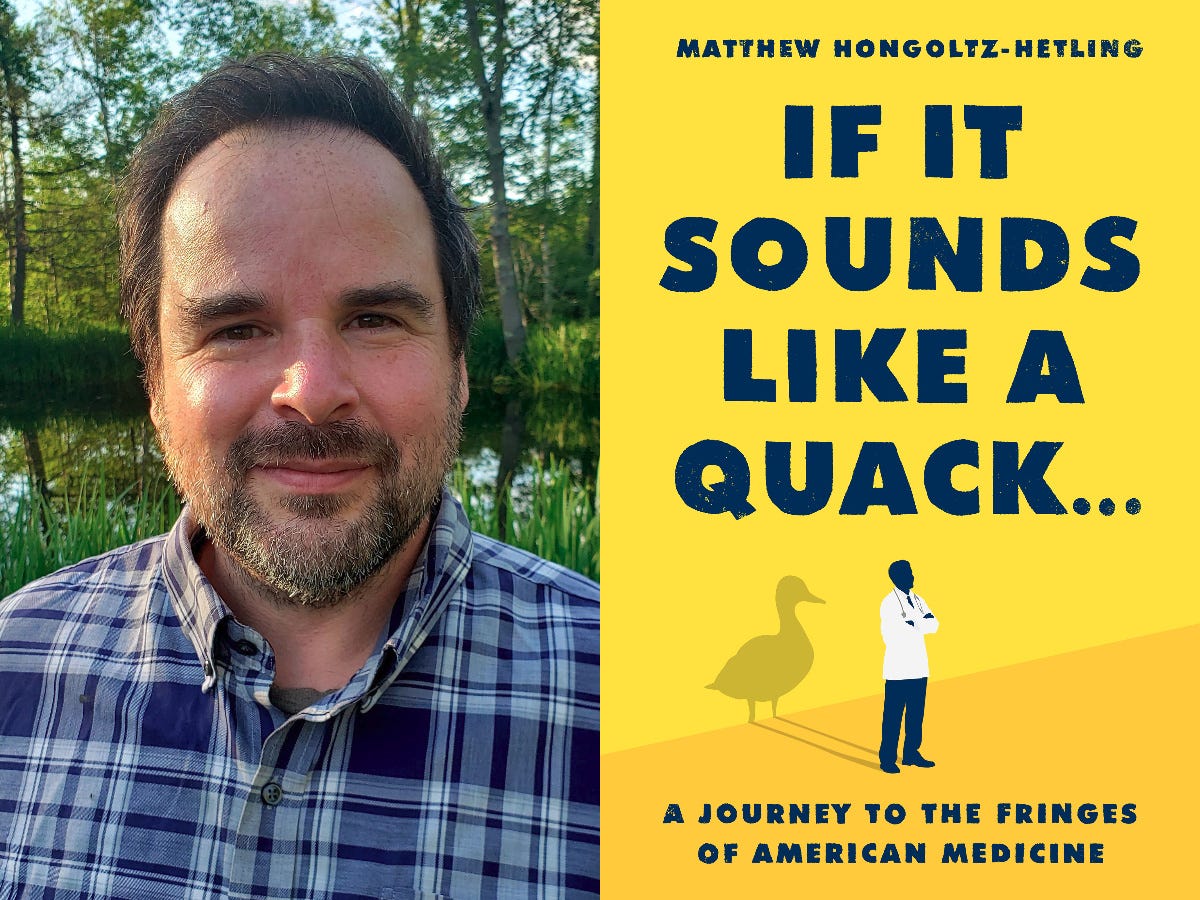An Interview With Author Matthew Hongoltz-Hetling
Few authors are as easily recommendable as Matthew Hongoltz-Hetling. With most of what I read, I can think of subsets of people who would or wouldn’t like it; with both of MHH’s books, the readability net is cast far and wide. Even if you tend to stick to fiction, I can almost guarantee you’ll enjoy his narrative-first explorations of bears + politics (A Libertarians Walks Into a Bear) and fringe medicine (If It Sounds Like a Quack…).
Matt was kind enough to take some time to answer a few questions about books and writing. Enjoy!
Both of your books are very funny in a subtle, often wry way. Any quick tips for injecting a bit of levity into otherwise serious and consequential topics?
Humor has become a vital tool for my writing lately, because I find that it makes the text much more accessible, and therefore magnifies its impact among audiences who don't want to be preached over. That being said, it's important to pick and choose your moments — even though I try to make the reading experience fun, working to force guffaws onto every page is a losing proposition. When I'm reporting, I keep my eyes open for those human foibles and flaws that not only make us chuckle, but also illuminate the personality of the person I'm writing about. And don't be afraid to make fun of yourself at the same time.
You have a wide journalistic range — you've done health and medicine, the environment, politics, and individual profiles, just to name a few subjects and forms. Do you credit that to being a good researcher? To having an openness to diving into new, unknown waters? Or are the things you write about actually more connected than it might seem at first blush? (It may also be a bit of all of these!)
Honestly, I think I'm just an indecisive person. The thought of specializing in a field closes so many reporting options that I prefer to be more of a generalist. I like to immerse myself in one area, understand it as best I can, and move on. Learning as I go is what makes it exciting, and it also prevents me from falling into a rut, where I'm just trying to repeatedly express the same thoughts in different packaging. I find I do better work when I'm coming in without preconceptions.
You convey a lot of empathy in your work, which I think is one of the most important qualities writers can strive for. Are there examples of empathetic books/writing that you've learned from?
Empathy abounds in journalism and nonfiction writing — we've all seen touching portraits of the kindhearted disaster victim, the hardworking athlete, the heroic teacher, etc. I think we also see lots of unflattering portraits — the sneering criminal in the courtroom, the heartless landlord, the idiotic politician.
The rarity is to see those two things blended together — I look for the heroic teacher who sneers in private, or the heartless landlord who becomes sympathetic when tragedy comes knocking. To me, that comes from being, not necessarily empathetic, but open to the invariable complexity of humans.
I don't know that I would point to any one writer as an influence in this regard, but I do always enjoy a story much more when there are layers to the people who populate it. John McPhee on Jackie Gleason, Bill Bryson on Babe Ruth, or even a fictional character like Jaime Lannister in George R.R. Martin's A Game of Thrones epic are all great examples of writers who have found in their characters a mix of sympathetic and damnable traits that make us both love and hate them.
Are there writers or books that have especially influenced your writing on a stylistic and/or organizational level?
Instructional books that have been particularly valuable to me include the anthology Telling True Stories: A Nonfiction Writers' Guide from the Nieman Foundation at Harvard University, Stephen King's On Writing, and of course Elements of Style by Strunk and White.
But as far as writers who I emulate, there are many that I look up to: Richard Grant, Bill Bryson, Katherine Boo, Michael Pollan, Seyward Darby, Laura Hillenbrand, George Saunders, Douglas Adams (Last Chance to See), and Erik Larson, to name a few. But I also look to fiction writers like Richard Stark, whose suspense novels show me how to open with a bang, and end on a cliffhanger.
What kind of reading do you do in your free time? Any favorite genres or authors you return to?
I am really pretty omnivorous — pulp novels of the crime (Michael Connely or Tess Gerritsen), Young Adult horror (Stephen King), sci-fi and fantasy (Nemison, and the Clarkes: Susannah and Arthur C.) genres regularly make appearances on my bed-adjacent book stack. I'll often enjoy some mainstream classic literature — Austen, Shakespeare, Dickens, Eliot. And I also like narrative nonfiction — John Mooallem, Luke Dittrich, Stefan Fatsis.
But the nonfiction genre that pulls me in most regularly is Science and Nature. I'm particularly into books that blend biological and cultural takes on some facet of the natural landscape, like Bernd Heinrich's Why We Run, Mark Lurlansky's Cod, or Robert Sullivan's Rats: Observations on the History & Habitat of the City's Most Unwanted Inhabitants.
This might be covered in the above two questions, but do you have any all-time favorite books that have had an outsized influence on your life? Books you think about and recommend on a regular basis?
The books that have had the biggest influence in my life have come when I was younger, and in a more fluid state of being. Now, I still find myself getting lost in all sorts of interesting worlds, both real and fictional, but I hesitate to elevate. It depends on who you are, and where in your life you find yourself.

